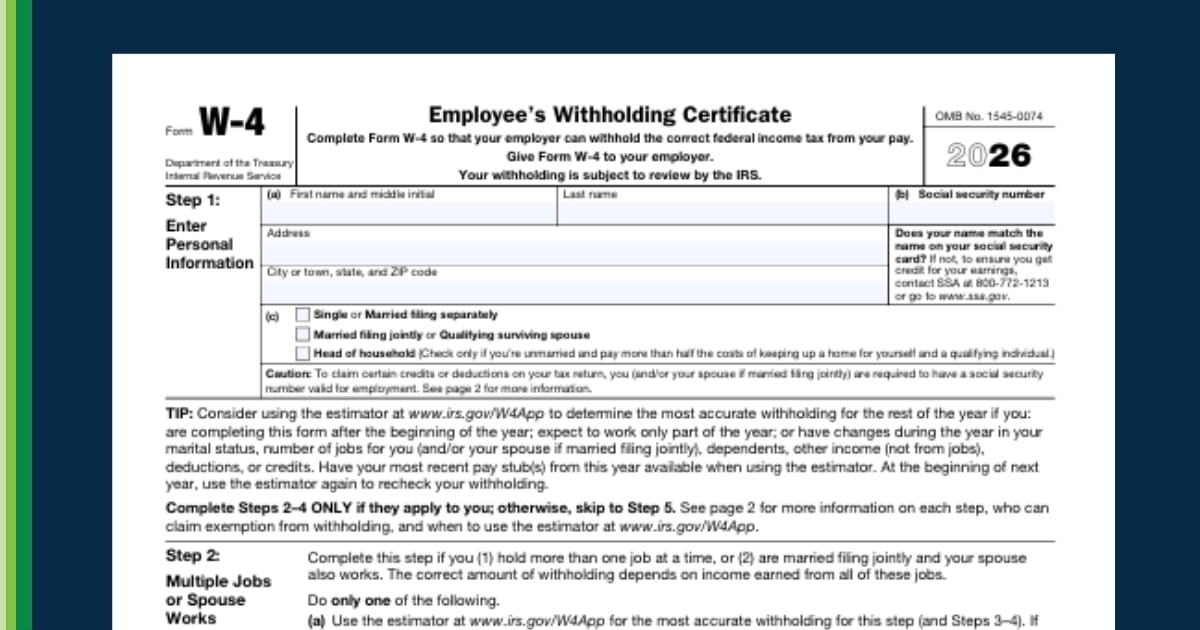Payroll deductions are sums of money employers withhold from an employee’s paycheck for various reasons, including mandatory legal obligations and optional personal contributions. It's crucial for employers to accurately manage these deductions to meet compliance requirements and correctly handle each employee’s pay.
Table of Contents:
Understanding Payroll Deductions
These deductions can be classified into two main categories: mandatory and voluntary.
Mandatory deductions are those required by law, such as federal and state taxes, Social Security contributions, and Medicare.
Voluntary deductions are made at the employee's request and can include contributions to retirement plans, health insurance premiums, life insurance premiums, and union dues.
Payroll deductions play a crucial role in helping employees' earnings comply with legal obligations while also allowing them to direct funds towards benefits and investments from their salary.
Mandatory Payroll Deductions
Mandatory payroll deductions ensure that employees and employers contribute to government programs and comply with tax obligations. These include:
Federal, State, and Local Taxes
- Federal Income Taxes: All employees are required to pay federal income taxes, which are withheld by their employer.
- State Income Taxes: Most states, with some exceptions, impose a state income tax. The specific rate varies by state.
- Local Taxes: Certain localities also levy a tax on residents within their jurisdiction, affecting those who live or work in specific areas.
Social Security Contributions
A total of 12.4% of an employee's wages is allocated to Social Security. This cost is split evenly between the employee and employer, each paying 6.2%.
Medicare
Medicare tax is set at 2.9%, also divided equally between the employee and employer, with each contributing 1.45%.
State-Specific Mandatory Deductions
Some states may impose additional mandatory deductions, such as disability insurance or unemployment insurance contributions. The specifics can vary widely between states.
Garnishments: Mandatory for Certain Employees
Garnishments are a form of payroll deduction but differ from the standard mandatory or voluntary categories. They are not universally applied but become mandatory for individuals subject to a legal judgment, such as for unpaid debts including child support, alimony, back taxes, or other financial obligations.
When an employer receives a court order for garnishment, they are legally obligated to withhold a portion of the employee's earnings and direct it to the creditor or specified agency. The amount and duration of the garnishment depend on the type of debt and jurisdiction.
Voluntary Payroll Deductions
Voluntary payroll deductions are selected by employees, providing them the flexibility to direct a portion of their earnings towards investments, insurance, and their preferred charitable or social initiatives, straight from their payroll. These include:
Retirement Plans
Many employers offer retirement savings plans, such as a 401(k) or IRA, which employees can contribute to directly from their paycheck, often on a pre-tax basis. This arrangement can provide tax advantages and help in building retirement savings over time.
Health Insurance Premiums
Under the Affordable Care Act (ACA), employers with 50 or more full-time employees are required to offer health insurance to eligible employees and their dependents. While smaller employers are not obligated, many choose to offer health insurance benefits.
Employee contributions toward employer-sponsored health insurance plans are typically deducted from their paychecks on a pre-tax basis, reducing their taxable income.
Life Insurance Premiums
Some employers offer life insurance policies as part of their benefits package, allowing employees to pay premiums directly from their salary. This convenient arrangement simplifies payments and ensures continuous coverage.
Union Dues
Employees who are members of a union may have their union dues deducted from their paycheck. These dues are used to fund the activities of the union, including collective bargaining and member services.
Charitable Contributions
A growing number of companies provide the option for employees to make charitable donations directly from their paychecks. This method of giving is not only convenient but may also offer tax benefits, depending on the employee's financial situation.
Handling Payroll Deductions
Managing payroll deductions is a critical aspect of an employer's responsibilities. Once deductions are made from employees' paychecks, these funds must be handled accurately and timely. This not only ensures compliance with various legal requirements but also maintains trust and transparency with your employees.
Processing Taxes
Federal income taxes, along with Social Security and Medicare contributions, must be forwarded to the IRS. Employers are responsible for making these payments according to the IRS payment schedule, which could be monthly or semi-weekly, depending on the total tax liability.
State and local taxes must be remitted to the respective state or local tax authorities, following their specific deadlines and rules.
Managing Voluntary Deductions
Properly handling voluntary deductions is crucial for maintaining compliance and employee satisfaction. Employers are responsible for ensuring that amounts deducted from employees' paychecks for voluntary reasons—such as retirement contributions, health insurance premiums, or charitable donations—are accurately and promptly remitted to the appropriate accounts or administrators.
The specific deadlines for these deposits can vary depending on the nature of the deduction:
- Retirement Contributions: Contributions to retirement plans like 401(k)s or IRAs must be transferred to the employee's account within a timeframe mandated by law. Typically, this is as soon as the funds can be separated from the employer's assets.
- Health Insurance Premiums: Premiums for health insurance must be paid to the insurance provider according to the terms agreed upon in the insurance contract. This ensures uninterrupted coverage for employees.
- Charitable Donations: For deductions made for charitable donations, employers should follow the organization's guidelines for remittance timing, ensuring contributions are made in a manner that allows employees to receive any applicable tax benefits.
Employers should establish clear policies and procedures for managing and remitting voluntary deductions.
Meeting Reporting Requirements
Fulfill reporting obligations such as submitting IRS Form 941 quarterly to report income taxes, Social Security, and Medicare taxes. Form 940 is required annually for reporting federal unemployment taxes (FUTA). State and local jurisdictions may have additional reporting requirements.
Legal Considerations and Compliance for Payroll Deductions
Understanding the legal landscape is important for payroll compliance. Failure to comply with payroll laws can result in significant penalties, legal fees, and damage to your company's reputation.
Key laws like the Fair Labor Standards Act (FLSA), set standards for minimum wage, overtime, and recordkeeping. State-specific regulations may dictate further requirements for employee compensation, benefits, and deductions. Employers must also adhere to federal and state tax codes and regulations regarding Social Security and Medicare contributions.
Best Practices for Maintaining Compliance
- Regularly Review Legal Updates: Stay aware of changes in federal, state, and local laws affecting payroll.
- Leverage Technology: Implement payroll software or services like Greenshades to simplify compliance. These tools are designed to stay updated with the latest tax rates and legislative changes, reducing the risk of errors.
- Consult with Experts: Consider working with payroll professionals or legal advisors to navigate complex regulations and ensure your practices are up to date.
- Maintain Detailed Records: Document each deduction, including tax withholdings, benefit contributions, and any other payroll deductions. This documentation should include the date, amount, and destination of each payment.
- Provide Documentation to Employees: Provide clear, detailed pay stubs that itemize gross wages, deductions, and net pay. This transparency helps build trust and allows employees to verify the accuracy of their deductions.
- Perform Routine Audits: Periodically review your payroll processes and records to ensure accuracy and compliance. This can help identify and rectify discrepancies before they become issues.
- Stay Informed and Educated: Encourage ongoing education for your payroll staff about the latest payroll compliance standards and best practices.
Enhancing Payroll Practices with Technology
Leveraging payroll solutions can transform the efficiency and accuracy of your payroll operations. Greenshades not only automates the intricate tasks of calculating deductions, submitting payments, and generating comprehensive reports but also ensures your payroll stays compliant with the ever-evolving tax laws and regulations.
- Automate Payroll Calculations: Reduce the risk of errors by eliminating the need for manual payroll calculations.
- Handle Compliance with Less Hassle: Stay up-to-date with the latest tax rates and legislative changes automatically.
- Enhance the Employee Experience: Provide employees with easy access to pay stubs, tax documents, and payroll information, all in one place.
Don't let payroll complexities hold your business back. With Greenshades Payroll solution, you eliminate the risk of errors, streamline your compliance efforts, and free up valuable time to focus on strategic business initiatives.
Explore Greenshades today and take the first step towards hassle-free payroll operations.



























